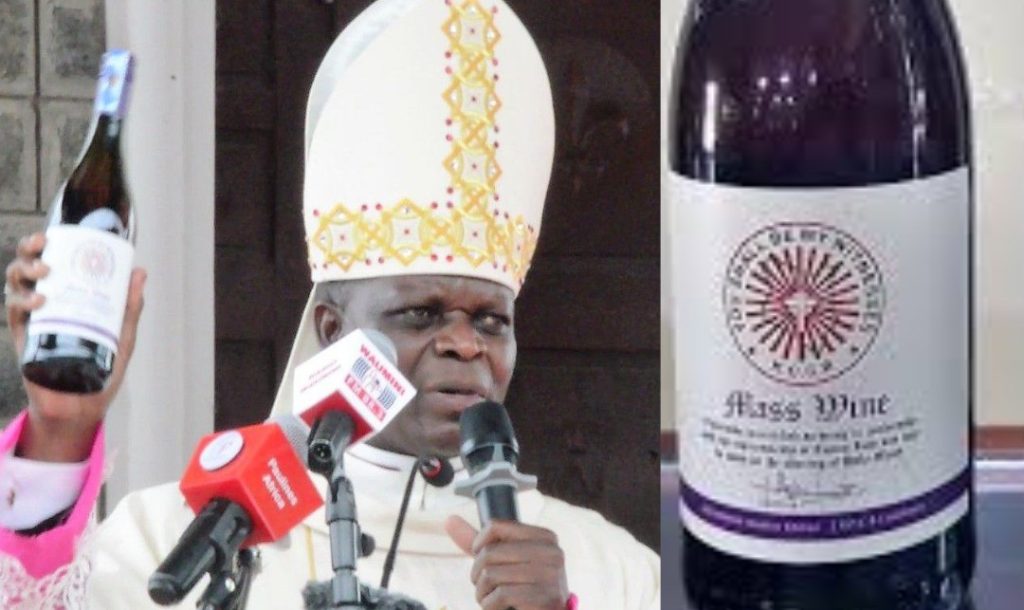Kenyan Catholic Church Introduces New Altar Wine to Preserve Sacredness
3 min read
The Church replaces its old altar wine after it became a popular drink in bars, sparking concerns about its sanctity and authenticity.
Kenya Conference of Catholic Bishops (KCCB) has officially introduced a new brand of altar wine to be used exclusively during Holy Mass. This decision follows rising concerns after the previous altar wine became widely available in local bars and shops across the country. The new wine, branded Mass Wine, carries the KCCB’s coat of arms and an official signature to certify its authenticity, making it easily identifiable as a sacred product.
Archbishop Anthony Muheria of Nyeri announced that the newly approved wine is imported, owned by the KCCB, and will only be distributed to dioceses for use in church ceremonies. “The newly approved wine is not for sale at any business outlet,” he stated.
Sacred Wine, Sacred Meaning
Wine holds a central place in Catholic Mass, symbolizing the blood of Jesus Christ. Traditionally, the priest drinks the wine during the Eucharistic celebration, and on certain occasions, it is shared with the congregation. Canon Law regulates the composition of sacramental wine to maintain its purity and sanctity.
Archbishop Muheria emphasized the Church’s responsibility in ensuring the quality of sacramental elements. “Vigilance on the quality and standards of the wine and hosts used in Mass is given to the Catholic bishops of the country. This is reviewed from time to time,” he explained.
Concerns Over Widespread Availability

The previous altar wine, which was distributed by a local alcohol manufacturer, became easily accessible in secular spaces including liquor shops, supermarkets, hotels, and bars. Many faithful members of the Catholic Church raised alarm over the casual sale of what they considered a sacred element.
“It has become common that unfortunately, the former wine is readily available in secular outlets and bars,” Archbishop Muheria lamented. This prompted the Church to explore other options to safeguard the sacredness of the Eucharist.
Selecting a New Vintage
After reviewing several wine options, the Church settled on a South African vintage that meets liturgical standards. The official unveiling of the new wine took place during this year’s National Prayer Day at the Subukia National Marian Shrine in Nakuru. Thousands of worshippers witnessed the event as Archbishop Maurice Muhatia Makumba, Chairman of the KCCB, held up the bottle of the new sacramental wine and announced its exclusive use nationwide.
Omega Tv UK celebrates ONE YEAR ANNIVERSARY, we wish to thank all our viewers for helping us reach this milestone.
Happy 1st anniversary to Omega TV UK!.
“This is the only wine that will be used in Mass celebrations across the country, going forward,” Archbishop Makumba declared.
Strict Guidelines for Distribution
All Catholic churches in Kenya have been instructed to stop using the old wine immediately and follow new distribution guidelines. Priests across the country have been directed to familiarise themselves with the approved outlets to ensure purity from the source.
The label on the new wine bears an inscription: “The fruit of the vine and the work of human hands will become our cup of joy”a phrase that highlights its spiritual purpose. By introducing this label and certification, the Church aims to protect the altar wine from being commercialized.
Safeguarding the Eucharist
Altar wine commonly called divai in Swahili is consumed in different quantities across dioceses, depending on the liturgical season. Demand traditionally peaks during Easter, Christmas, and other major religious celebrations.
Many Catholic faithful have expressed strong support for the decision. “It is a valid step toward preserving the sacredness of the Eucharist and ensuring that only properly prepared wine is used for Mass,” one church member said.
Faith in Numbers
Kenya has a population of about 50 million people, with over 80% identifying as Christians. Of these, approximately 10 million are Catholics. Other Christian groups belong to evangelical, Anglican, and Presbyterian denominations.
With this move, the Catholic Church hopes to reinforce the spiritual meaning of the Eucharist and prevent the misuse of altar wine in non-religious settings.







Keep writing! Your content is always so helpful.
I love the clarity in your writing.